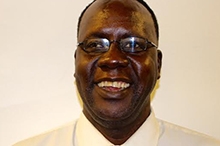Successful Integration for New Americans

Gatluak Ter Thach is being honored as a White House Champion of Change for World Refugees.
Integration is complex. I think it is significant to recognize what it takes to create an integrated community. This task requires knowledge of processes and resources. Successful integration as part of a “New American Dream” is a role both hosts and New Americans should play. Even though resettlement agencies, both at the national and local levels, play their roles by providing refugees, pre- and post-resettlement services, successful integration is not realized in a few months or even years.
Lack of cultural knowledge as well as connections to important elements constrain integration. Knowledge of the English language is one of the most important things to gain integration. When I first arrived in this country, I didn’t know English. It was difficult for me to navigate the complex American systems. I pledged that I would do everything I could to change it. I decided to learn English well enough to enroll in a learning center in Nashville before I transferred to a two year college and then Tennessee State University where I graduated with a bachelor’s degree in computer science with minor in mathematics.
After I realized I needed to heed my family’s hopes that I settle down and get married, I thought of a little girl I met in Itang Refugee Camp in Ethiopia before I left. This girl was about eleven years old, but I promised to marry her when we both grew up. I provided her a small photo of me and told her not to marry anyone else unless she heard I died. I called and asked my brother in Ethiopia to find out more about where she was. I asked him to look for the girl who used to come through our compound to fetch water. I reminded him that after she approached us with her sisters and friends, we asked her to give us her water, and she would give us her water and return to a river to fetch more. Because of her generosity, I started to call her “my future wife,” and all of our family members and friends called her “Gatluak’s wife.”
My brother got back to me with great news about the girl. After I spoke with her and her family, I decided to go to the camp in Ethiopia to marry her. In the spring of 2004, we were married in a traditional wedding in the refugee camp. I returned to the United States and petitioned for her to join me. After she landed in Nashville, I realized Sudanese women faced unusual challenges to integration. I knew my wife needed to learn English since I could envision how difficult our lives would be, especially if Kuoth Nhial (God of Heaven) blessed us with a child.
I thought of what to do to help her. I bought a whiteboard and put it in the front seating area in our apartment to teach her the ABCs. Before I knew it, ladies from the Sudanese community joined her. Some of women walked miles for the English lessons. My apartment wasn’t big enough for these women and their children. I started to ask some Sudanese friends, “Guys, we need to rent a place where women can learn English because they really need our help,” and that was the beginning of the Nashville International Center for Empowerment (NICE), formerly Sudanese Community and Women’s Service Center, which serves refugees and immigrants from 72 different countries through a variety of programs. My work is to ensure refugees and immigrants are successful integrated into their new community through economic, social and civic empowerments.
Dr. Gatluak Ter Thach is the President and CEO of the Nashville International Center for Empowerment.
White House Blogs
- The White House Blog
- Middle Class Task Force
- Council of Economic Advisers
- Council on Environmental Quality
- Council on Women and Girls
- Office of Intergovernmental Affairs
- Office of Management and Budget
- Office of Public Engagement
- Office of Science & Tech Policy
- Office of Urban Affairs
- Open Government
- Faith and Neighborhood Partnerships
- Social Innovation and Civic Participation
- US Trade Representative
- Office National Drug Control Policy
categories
- AIDS Policy
- Alaska
- Blueprint for an America Built to Last
- Budget
- Civil Rights
- Defense
- Disabilities
- Economy
- Education
- Energy and Environment
- Equal Pay
- Ethics
- Faith Based
- Fiscal Responsibility
- Foreign Policy
- Grab Bag
- Health Care
- Homeland Security
- Immigration
- Innovation Fellows
- Inside the White House
- Middle Class Security
- Open Government
- Poverty
- Rural
- Seniors and Social Security
- Service
- Social Innovation
- State of the Union
- Taxes
- Technology
- Urban Policy
- Veterans
- Violence Prevention
- White House Internships
- Women
- Working Families
- Additional Issues

